A Parent’s Guide to Parentification (And How to Avoid It!)
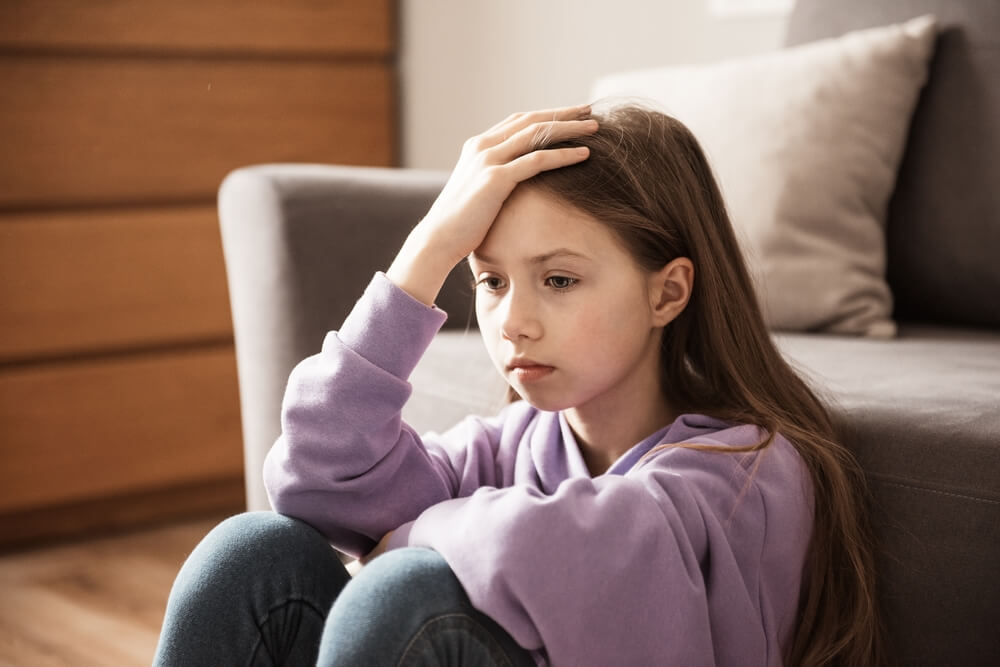
Have you ever wondered what it would be like if the parent-child roles were reversed? There is a name for this type of dysfunction in a family. It’s called parentification.
In this article, we’ll provide a more in-depth definition of parentification, discuss its various types, and talk about the healing process. Perhaps most importantly, we’ll also address how to avoid this toxic dynamic in your own family.
Contents:
- What Is Parentification?
- How and Why Children are Parentified (Plus Examples)
- Signs and Symptoms of Parentification
- Long-Term Effects of Parentification
- How Can You Avoid Parentification?
- Healing from Parentification
What Is Parentification?

Olimpik/Shutterstock.com
Children aren’t developmentally equipped to handle the same responsibilities as adults. Though this should go without saying, many parents (intentionally or otherwise) assign tasks to their children that are not age-appropriate. This phenomenon is called parentification.
Parentification is a type of adultification, meaning it involves children being treated as if they are adults. And it can take a psychological toll on youngsters.
Perhaps the most disturbing part of parentification is that children often don’t even realize it’s happening until the damage has been done.
Is Parentification Abuse?
Parentification is unhealthy, no doubt. But is it abuse? The short answer is “yes.”
Many mental health experts recognize parentification as a form of abuse, especially when the parentification is severe. In these cases, the abusive parent neglects the basic physical and/or emotional needs of the child.
Sometimes, parentification is described as “covert abuse.” That is, with parentification, the abuse is often unintentional and the abuser and/or abused may not even realize it’s happening. It’s important to acknowledge, though, that even when abuse is covert, it can be just as harmful.
Is Parentification Trauma?

Teerasan Phutthigorn/Shutterstock.com
When we talk about childhood trauma, we may envision cases of extreme neglect or violence. Even seemingly “normal” childhoods can be traumatic, though. This is often the case with parentification.
Whether or not you classify parentification as abuse, it can certainly be traumatic for children. This is especially true in intense cases where children are burdened with caring for a parent who has a substance abuse disorder or who is emotionally unstable. Even less dramatic instances of parentification can cause trauma.
Parentification can be classified as “relational trauma.” Relational trauma is trauma that occurs within a close relationship such as a mother-daughter or father-son relationship, for instance.
Can Parentification Be Beneficial?
This is a complicated question. It is true that parentified children often develop attributes that are seen as advantageous such as reliability, empathy, and resilience. These are things that can be embraced and used as tools later in life. Children who are parentified are often praised by parents and other adults for their maturity and responsibility. They may even pride themselves on these traits.
Still, parentification should never be used as a parenting technique or strategy. Why? Because it’s clear that while there can be silver linings to parentification, the negative effects far outweigh any positive consequences.
Children who are parentified suffer emotionally in both the short and long term. They often have trouble coping with the demands of life. In the worst cases, these kids develop severe mental health conditions as well as substance abuse problems.
Types of Parentification: Emotional Versus Instrumental

Ekateryna Zubal/Shutterstock.com
Like many other types of family dysfunction, parentification exists on a spectrum. It may look different from one family to the next. Still, there are two general types of parentification: emotional and instrumental.
Emotional Parentification
As parents, it’s our job to teach children how to deal with complex emotions. Sometimes, though, moms and dads aren’t able to handle their own emotions, much less guide their children to process feelings. This is a huge risk factor for emotional parentification.
Emotional parentification occurs when a child tries to manage the emotions of one or more parents. This often results in the child ignoring or suppressing their own feelings. In families where emotional parentification is present, the parentified child may feel responsible for the well-being of a parent or even the family as a whole.
Emotional parentification often occurs when:
- A parent is disabled or suffers from a mental health condition.
- Mom or dad (or both) abuses alcohol or drugs.
- The family lives in an abusive environment.
- The parents are going through a divorce or argue a lot.
- Past parentification in the parent’s family.
Instrumental Parentification
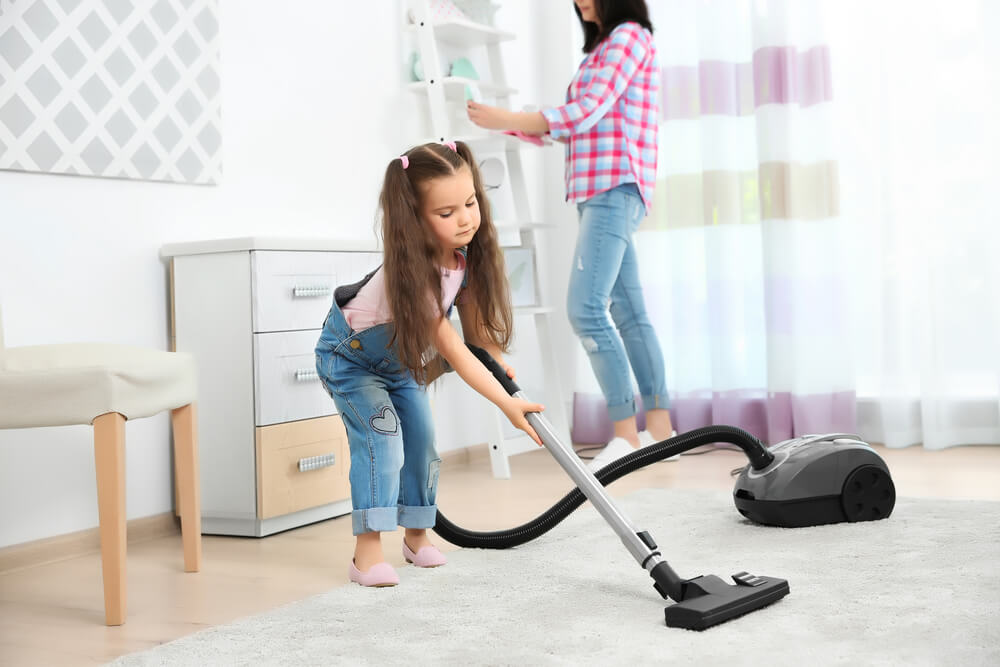
Africa Studio/Shutterstock.com
Instrumental parentification is often seen as a more outright form of parentification (though emotional parentification is just as harmful). That’s because children who are parentified instrumentally are directly assigned responsibilities that are inappropriate for their age and/or development. For example, an instrumentally parentified child may be responsible for cooking and cleaning, paying bills, or taking care of younger siblings. Clearly, these are tasks the parent is responsible for, yet the roles have been reversed.
How and Why Children are Parentified (Plus Examples)
Parentification usually isn’t intentional. Parents don’t typically decide to have children for the purpose of having them take on the responsibilities of the household or family. It’s usually more complicated than that, though this acknowledgment does little to ease the painful effects of parentification.
So, if it’s not intentional, how does parentification occur? And why? There are actually numerous possible explanations. Below, we’ll discuss a few of the common scenarios we see with parentification in families.
Immature Parents
There are many risks young parents take when they have children, and parentification is one of them. When moms and dads themselves haven’t developed fully, they find themselves ill-prepared to help their children meet developmental milestones.
Even more troubling, they may begin to rely on their children to shoulder some of their own adult responsibilities. In these cases, the roles in parent-child relationships become blurry. Children may have to keep the household running when mom or dad gets overwhelmed, for instance. Or, they might have to listen to a parent complain excessively about the difficulties of life.
Parents Who Disagree
Ideally, the two parents in a relationship come together to share the responsibilities of raising a child. They support and encourage one another throughout the challenges of parenthood. Unfortunately, this ideal scenario isn’t always reality. When parents argue frequently, the risk of parentification increases.
One common form of emotional parentification occurs when parents involve children in their disagreements with one another. This creates an unfair and toxic situation for children who are put in the impossible role of supporting one parent while protecting the other. Understandably, the child in the situation becomes anxious, stressed, and even fearful.
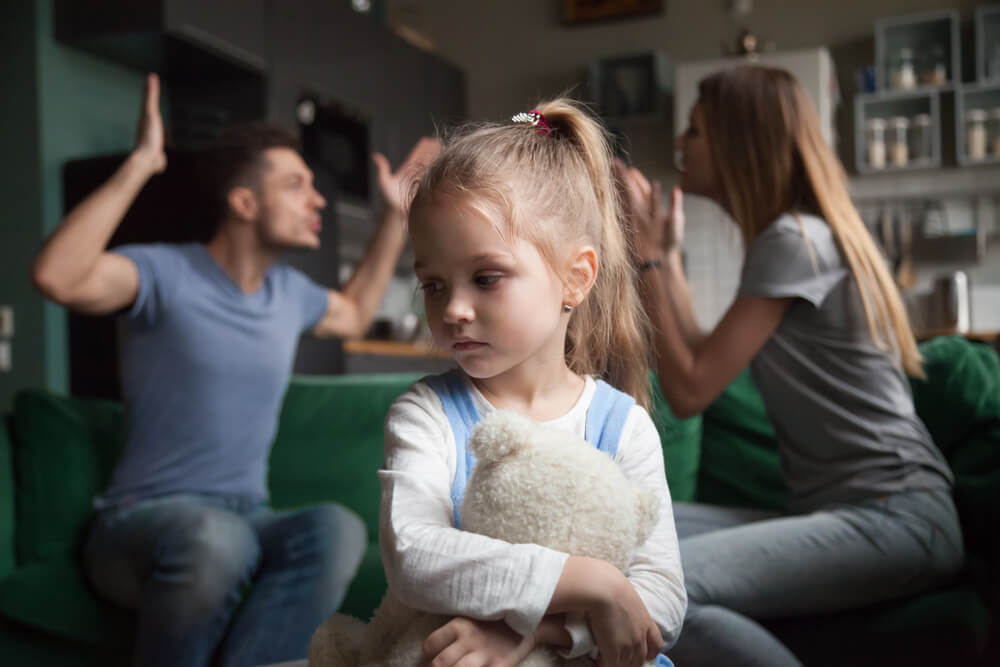
fizkes/Shutterstock.com
Parents Who Are Unwell
Children whose parents are mentally or physically ill are at a higher risk of parentification. When moms and dads lack the skills they need to maintain a household, the responsibilities are often shifted to the child. In extreme cases, the child may be forced to earn money for the family or to provide care for a sick parent.
Impoverished Parents
Parents who struggle financially also run the risk of parentifying their children. In these families, survival often becomes the sole focus, so a child’s emotional needs may be perceived as secondary or even entirely unimportant.
Low-income parents may be forced to work multiple jobs and have little or no time to provide basic care for the household. In some impoverished families, children may even be forced to take a job to help provide for the family.
Parentified Parents
Parentification can sometimes have a generational component. That is, parentified children become parents who, in turn, parentify their own kids. This generational cycle continues because moms and dads who have been victims of parentification themselves lack the ability to take care of their own emotional needs, much less those of their children.
Signs and Symptoms of Parentification
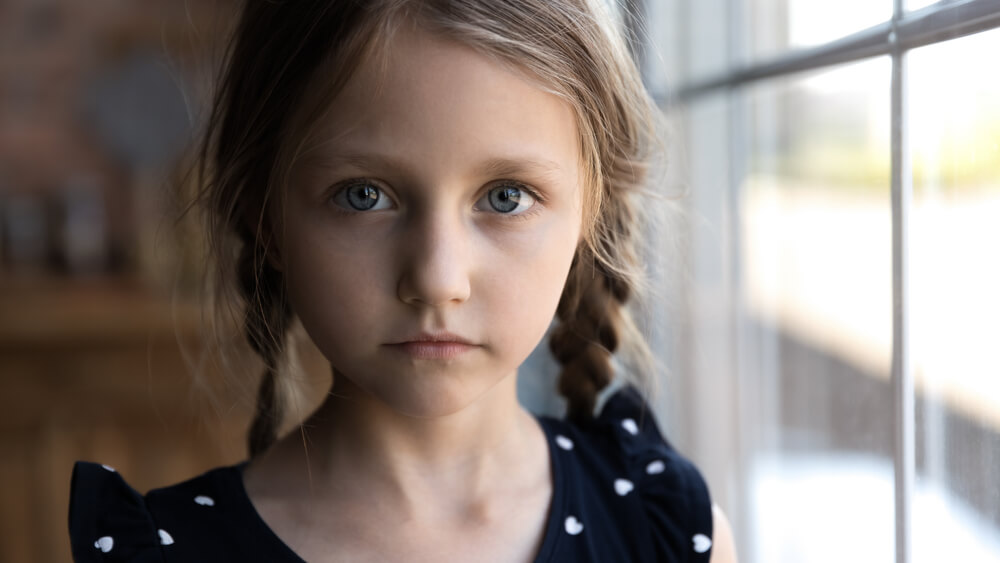
fizkes/Shutterstock.com
Can you tell if a child has been parentified? Not always, especially at first glance. Parentification can affect some kids differently than others.
Still, there are some classic signs and symptoms of parentification. Here are a few to be aware of:
- Difficulty asking for help.
- Displaying “people-pleasing” behaviors.
- Affinity for being a caregiver.
- Has a hard time trusting others.
- Finds it difficult to relax or have fun.
- Feels taken for granted or unappreciated.
- Difficulty remembering childhood, especially carefree times.
- Elevated sensitivity to others.
- Falls into the “peacemaker” role easily.
- A level of responsibility disproportionate to one’s age.
- A need to be in control.
- Physical symptoms like frequent headaches and stomach aches.
- Feelings of guilt, shame, and/or alienation.
- Problems socializing or conflict with friends.
- Depression, anxiety, and/or substance abuse.
Protect your child from any threats—internal (experiences, fears) and external (traffic hazards, strangers, etc.). Always know where they are, listen to what is happening around them and reach them in any situation with the Findmykids app.
Long-Term Effects of Parentification
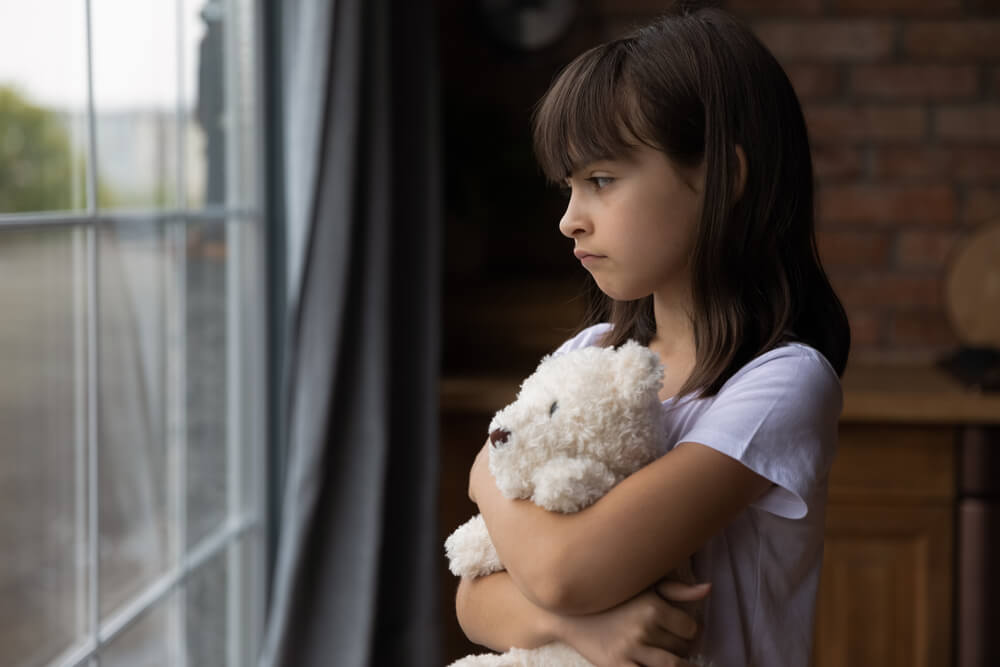
fizkes/Shutterstock.com
Unfortunately, children don’t escape the negative effects of parentification when they leave home. Many of the repercussions of their childhood trauma follow these kids into adulthood.
Failing to Become Independent
Many children who are parentified have trouble becoming fully independent as they transition into adulthood. Because they were taught to see their needs as inferior to the needs of their parents, they never quite learn to take care of themselves.
Plus, young adults who were parentified may still feel a strong sense of responsibility to their parents and/or siblings. They may feel compelled to continue taking care of others, whether emotionally or physically, instead of focusing on building a life for themselves.
Poor Boundaries as an Adult
Even those parentified children who do become independent may repeat toxic patterns in their own relationships. Inadvertently, they may seek relationships that are one-sided or codependent because of the familiarity these types of connections bring.
For example, a young adult who was parentified as a child may find themselves with a partner who demands all of their time and attention. Instead of seeing this as a red flag, the individual may associate these demands with the same sense of warped “love” given to them by their parents growing up.
Pervasive Anxiety

Ground Picture/Shutterstock.com
A range of long-term mental health conditions is associated with childhood trauma. With parentification, anxiety seems to be a common issue. Children who are parentified often feel overwhelmed with the huge responsibilities they are given at a young age. As a result, they may come to view the challenges of life as daunting.
To make matters worse, parentified kids are forced to be self-reliant and may have no one to turn to when they experience personal struggles. Thus, they may experience intense feelings of fear, anxiety, and isolation well into adulthood.
How Can You Avoid Parentification?
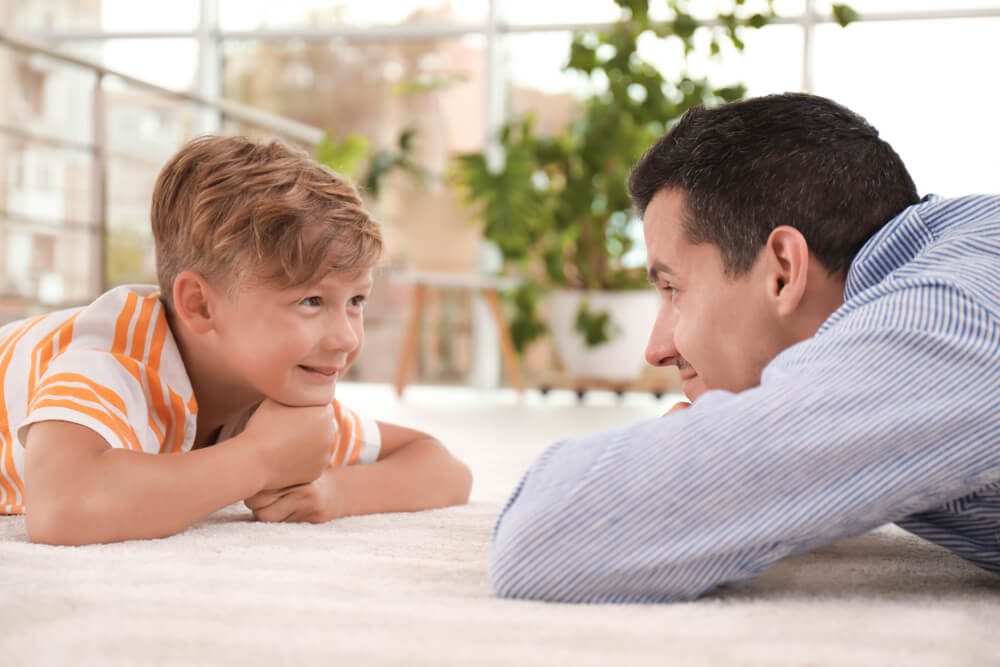
New Africa/Shutterstock.com
Parentification can have lasting effects on a child’s emotional well-being, making it difficult to set boundaries, build healthy relationships, and maintain self-worth. Many parentified children grow up struggling with anxiety, guilt, or the feeling that they must always put others first.
Understanding different parenting styles and their effects on children can help caregivers recognize patterns that may contribute to emotional distress and find healthier ways to support their child’s development.
With this awareness, there are also concrete steps moms and dads can take to avoid parentification and raise emotionally healthy children.
Let Them Play
It may sound like an oversimplification of the issue but remembering that a child’s most important work is play is the first step to avoiding parentification. When kids play, they’re not just passing time. They’re engaging in learning experiences that help them develop vital life skills.
Building a tower with blocks or kicking a ball helps toddlers develop motor skills they’ll rely on for the rest of their lives. Later on, adolescents who “hang out” with friends online or in-person are developing crucial social skills. So when in doubt, let the kids play—they’re actually learning important lessons they’ll need to be successful adults one day!
Learn About Your Child’s Development
Kids are amazing, no doubt. But sometimes moms and dads give their kids too much credit. We assume they can handle things that they’re not developmentally ready for. This is where parentification can cause the most damage.
To avoid overburdening your child (mentally, physically, or emotionally), it’s a good practice to learn about your child’s developmental stages. You can do this by purchasing books or reading credible articles online. It may also be helpful to talk to your child’s pediatrician or a school counselor.
Our blog has a whole section dedicated to the main milestones in the development of children of different ages. You can go and read all the information that interests you!
Parents who know better do better. Once you are aware of what your child can do developmentally, be sure to keep chores and household duties manageable.
Cultivate a Support System

YAKOBCHUK VIACHESLAV/Shutterstock.com
Everyone needs someone to talk to from time to time, even moms and dads. To avoid parentification, though, you’ll need a support system of your peers. Too many times, parentification happens when parents feel like they have no one to talk to aside from their own children.
Children typically care deeply for their parents, and they want to help. Unfortunately, if they see you struggling, they’ll neglect their own needs to help you with yours. While noble, this pursuit to care for a parent can come at a steep cost to the child’s own mental and emotional well-being.
That’s why it’s crucial to set healthy boundaries with your child. Avoid talking to your kid about heavy emotional topics that he or she may be unable to understand or process. Don’t use your child as a sounding board or confidante. Instead, rely on a support system of friends, adult family members, and/or mental health professionals.
Support your children in return. It doesn’t matter what difficulties your child has encountered—bullying at school, problems in communicating with adults or other difficulties. Find out what is bothering them with the help of the Findmykids app and come to the rescue on time!
Seek Professional Help
Parentification is one of many unhealthy patterns that exist in families all over the world. If you recognize this dynamic in your own family, don’t be ashamed to seek help. It’s far better to remedy these problems now than allow them to continue doing harm to those you love.
A mental health professional trained in family therapy can help you unravel the detrimental effects of parentification. The sooner your family recovers, the happier and healthier everyone will be.
Healing from Parentification

Red Fox studio/Shutterstock.com
While it’s true that parentification can have traumatic short-term and long-term effects, it doesn’t have to be a life-long struggle.
Family Therapy
The sooner parentifying is identified within a family, the better. If caught early, family therapy can be used to reverse this toxic family dynamic. A competent therapist may be able to help the parent recognize the unintentional harm they’re inflicting on their child and begin to make healthy changes. Moreover, family therapy can help address the child’s unmet functional and emotional needs.
Unfortunately, most children who are parentified aren’t given the opportunity to benefit from family therapy. Many won’t realize the negative effects of their upbringing until they reach adulthood.
Individual Counseling: Cognitive Behavioral Therapy (CBT)
Children (and adults) who suffer from the long-term effects of parentification may benefit from individual counseling with a licensed mental health professional. This type of counseling usually involves a specific therapeutic technique like cognitive behavioral therapy (CBT), for instance.
CBT helps individuals identify patterns of thinking that are harmful to them. For those who experienced parentification as a child, CBT may help them pinpoint thoughts and behaviors that helped them survive their childhoods but are no longer beneficial to them.
For instance, parentification often causes kids to think that their feelings and needs are secondary to their parents and/or siblings. In cognitive behavioral therapy, individuals will learn how to reverse these negative thought patterns and begin to make themselves a priority.
Reparentification (AKA Inner Child Work)
Not every child who was parentified requires professional therapy (though it can’t hurt! ). It is possible to recover through a self-help technique called reparentification. With reparentification, the survivor must get in touch with their inner child to discover needs that were unmet during childhood. By listening to this inner child, they can begin to provide themselves with the type of parenting they needed but never received as a kid.
Parentification: The Bottom Line

BearFotos/Shutterstock.com
Parentification is a complicated term. The concept itself is fairly simple, though. When moms and dads transfer parental roles to their child (intentional or otherwise), they’re inflicting a particularly harmful type of emotional abuse.
The bottom line for parents is that it’s never okay to burden a child with grown-up problems or responsibilities. This can feel like a slippery slope. After all, parents should be able to share their feelings, and they must assign chores, right? Yes. However, that’s very different from making a child feel responsible for your wellbeing or the state of the entire household. This is why it’s important to set clear and healthy boundaries within the parent-child relationship.
Have you experienced parentification in your own family (past or present)? Speak out about your experience, and share this article to help raise awareness about this harmful family dynamic.
The picture on the front page: Iren_Geo/Shutterstock.com
Проверьте электронный ящик



















